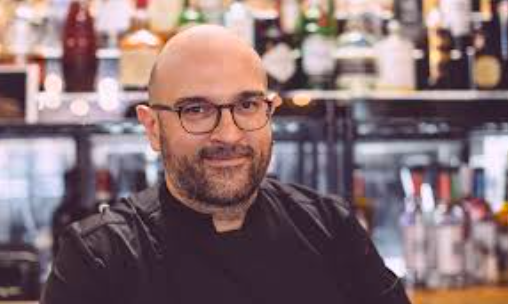Lifestyle
An Italian Chef, Michele Casadei Massari, Raising the Standards of the New York’s Fine Dining Scene

New York, a land of captivating skyline view, dotted by exquisitely designed skyscrapers, a dynamic metropolis of art, fashion, theatre, and food, serves as the center of entertainment for the world. People from all across the world come to enjoy the richness of its all five boroughs, walk around some of the world’s best museums, and arts, visit the world’s most famous street cuts, Broadway, and the diverse food scene.
New York’s food is a highlight, and one of the top reasons why this part of the United States is one of the most popular traveling destinations. From high-end global food chains to international and experimental food, this place has a lot to offer when it comes to food. Katz’s Delicatessen, Peter Luger, Lombardi’s, Keens Steakhouse, Tavern on the Green, Lucciola restaurant, and Piccolo Café are the eat-out spots that dominate New York’s food scene.
Lucciola restaurant and Piccolo Café are restaurants that were founded by an Italian-born chef, who learned how to cook by working at a wood-burning kitchen. Michele Casadei Massari, a food-enthusiast from Italy, is taking New York’s restaurant sector by a storm. Landed in New York in 2009, this man runs five restaurants today. The fact that he started his culinary profession from a ‘coffee-kiosk’ makes his story worth bringing into the limelight.
The Five-Ingredient Chef, Serving the Food Sector the Right Way
Michele Casadei Massari is an executive chef that uses five ingredients to create his signature dishes at the restaurants. He follows this strict rule, and it has helped him distinguish himself from the hundreds of chefs that are working in New York. He believes that too many ingredients negatively impact the true flavor and feel of a dish. To experience the real taste and enjoy the true flavors, a minimalist approach is what makes Michele, New York’s famous, “Five-Ingredient’s Chef.”
The first of the five Piccolo Cafe Restaurants started serving the food-lovers with an exquisite range of delicious dishes on April 1, 2009. At this time, the young and aspiring chef was unsure about the performance of his restaurant. However, his restaurant performed phenomenally well that within six months, another restaurant was opened in the New York Times Building. Serving its guests with delicious salads, Panini, Pasta, desserts, and coffee, this restaurant expanded further, and the total number of branches reached five. Not only this, but in 2014, Michele’s restaurant started its catering service, which like the restaurants, was a huge success.
Michele, through the Piccolo Cafe Restaurant, has provided catering services to notable companies, including Ferrari North America. Were the four Piccolo Café restaurants enough? No. Michele wanted to dominate the New York food sector with his elite cooking skills as he laid the foundation for another restaurant, Lucciola. It started operating in on December 1, 2017, and is located on 90st Street and Amsterdam Avenue.
As Michele was born in Romagna, Riccione, and raised in Bologna, he was eager to bring the taste of his hometown to New York. Even though he left his homeland for the sake of his dream, he could not let go of his fondness for Italian cuisine. Lucciola started as an Italian restaurant to bring the taste from Michele’s hometown to New York.
A Dreamer and a Doer
While everyone in this world is a dreamer, there are not many doers. While everyone has the power to dream, not everyone has the courage to turn them into reality. Making a dream come true is not a matter of fate or luck. Instead, it takes numerous sacrifices to achieve life goals.
Michele was not just a dreamer; he was a doer. Acquiring exceptional cooking skills from his grandfather, Gigi, by assisting him in his cooking in a wood-burning kitchen, to owning five restaurants, takes much more than just hard work. The cooking enthusiast cooked his first dish for his mother when he was just nine years old since then; the passionate individual has not given up on his dream.
At the time he was enrolled in medical school, he started working at restaurants as a part-time employee. It helped him establish the roots of his culinary career. While working at the local restaurants, he decided his love for food surpassed that of medicine.
In 2009, Michele went to New York after his idea to start a coffee-kiosk was accepted after being rejected once. He started his coffee-kiosk, which gained popularity almost immediately, and he began receiving offers to open a proper restaurant. New York’s food industry is a highlight in the world, and Michele elevated the entire food scene with his powerful culinary skills powered by a strong passion for becoming a top chef in the world.
Lifestyle
From Broken to Whole: The Radical Reawakening Behind The XI Code

Elle dela Cruz
Most healing begins with the assumption that something is broken. That the fix lies in the right therapist, diet, retreat, or ritual. Patchwork solutions for a fragmented self.
But for clients of The XI Code, the breakthrough did not come by fixing what was broken, it came by remembering what was never damaged to begin with.
It is not a spiritual placebo or self-help remix, rather a recalibration, a return, a radical stripping away of every distortion that ever claimed authority over who you are. Founded by Masati Sajady, The XI Code has become a sanctuary for those who sensed there had to be more and now live the proof of it.
This is not talking about polite gratitude or glow-up affirmations, these are accounts of full-system transformation, physical regeneration, identity coherence, and a kind of inner homecoming that makes every previous attempt feel like a rehearsal.
“This isn’t about self-help,” says Masati. “This is about self-realization. There is a version of you untouched by pain, trauma, or time and that is what XI reveals.”
Remembering the Self Beneath the Static
Those who enter the XI space often describe their experience not as something new they learned but as something ancient they finally remembered. One client shared: “I listened to Masati’s podcasts during a bottomless depression. I swear it pulled me from the dark to the light.”
But the words they use are not mystical or out of reach, rather grounded. “I feel safe in my body.” “I’ve come home.” “I finally see myself.”
This is not a performance of healing, it is a quiet, cellular knowing.
“I survived death and decoded life,” Masati explains. “I returned with the blueprint for those ready to rejuvenate the body, unlock peak performance, and evolve humanity.” Those words, radical to some, feel like a memory to others. As if, somewhere deep inside, they always knew this was possible.
When the Body Starts Listening
While XI is not a medical protocol, many clients describe physical transformations that coincide with their inner shift. One wrote: “I’ve begun rendering myself as my highest form, right here, in this space and time continuum.”
Another called it “the most effective healing method” they had found after years of traveling the world for answers. But the common thread was coherence. A recalibration across dimensions: physical, emotional, energetic, and ancestral. It is about resolving distortion at the origin point.
Rewriting the Lens of Reality
After engaging with The XI Code, many report not just feeling better but seeing life differently. Like a veil lifted. Like their perceptual field was reset.
One wrote: “My whole life is changing in every way and it’s just unfolding on its own. Every day, synchronicities. It’s like magic.”
Another put it simply: “I found my home and I wasn’t even looking.” Again and again, the word home appears in these testimonials not as a destination but as a state of being.
Masati explains this with precision: “XI doesn’t upgrade the version of you that’s broken. It reveals the YOU that was never broken to begin with.”
A Quiet, Powerful Community
Though The XI Code is not marketed as a group program, many clients describe a shared energetic field as being held by a collective intelligence moving through similar layers.
“I can’t wait to wake up and see how much more beautiful I’ve become,” one said not from ego but from evolution.
Because the work does not stop when the session ends. The system keeps unfolding, recalibrating, and upgrading.
Not for Everyone But For the Ready
Masati is unapologetic: “The XI journey requires the courage to see Truth on all levels, in all arenas, and to accept responsibility for the Life you’ve been gifted.”
It is not for those seeking a new story to believe in, rather for those ready to remove every distortion that ever told them they weren’t enough.
And what remains? The version of you before distortion and the one that was always whole.
You do not need to become someone new. You need to meet who you were before the noise.
-

 Tech4 years ago
Tech4 years agoEffuel Reviews (2021) – Effuel ECO OBD2 Saves Fuel, and Reduce Gas Cost? Effuel Customer Reviews
-

 Tech6 years ago
Tech6 years agoBosch Power Tools India Launches ‘Cordless Matlab Bosch’ Campaign to Demonstrate the Power of Cordless
-

 Lifestyle6 years ago
Lifestyle6 years agoCatholic Cases App brings Church’s Moral Teachings to Androids and iPhones
-

 Lifestyle4 years ago
Lifestyle4 years agoEast Side Hype x Billionaire Boys Club. Hottest New Streetwear Releases in Utah.
-

 Tech7 years ago
Tech7 years agoCloud Buyers & Investors to Profit in the Future
-

 Lifestyle5 years ago
Lifestyle5 years agoThe Midas of Cosmetic Dermatology: Dr. Simon Ourian
-

 Health6 years ago
Health6 years agoCBDistillery Review: Is it a scam?
-

 Entertainment6 years ago
Entertainment6 years agoAvengers Endgame now Available on 123Movies for Download & Streaming for Free
